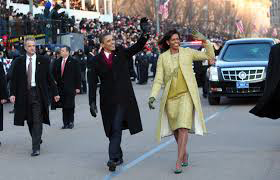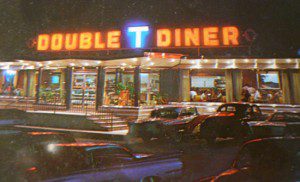
I met Barack Obama in the Washington, D.C., area 44 years ago.
Yes, I know, you’re already doing the math. The newly inaugurated 44th president of the United States of America was only three years old in 1965. Obama’s parents had just recently divorced by that time. And shortly thereafter the young son of a white American mother and a black Kenyan father found himself in Jakarta, Indonesia, attending grade school. How could Barris have met the man who – on Tuesday at midday – became America’s first ever African-American president?
Well, you see, I encountered the spirit of Obama in 1965, the summer I worked in my uncle’s restaurant in nearby Baltimore, Maryland. I knew him as Mr. Beale. And he knew me as the kid from Canada. He was a dishwasher and I was a busboy. That was his permanent job; mine was a way to raise spending money on my vacation. He taught me a lot that summer, not about dishwashing, but about America, life, persistence and hope.
“We shall overcome,” he would often say to explain things.
Those words weren’t original to Mr. Beale. They were, of course, adopted by a generation of Americans who witnessed a beloved president assassinated, astronauts land on the moon, an unpopular foreign war, the desegregation of U.S. schools and the martyrdom of their nation’s greatest civil rights leader, all in the same decade.
But I remember Mr. Beale using them whenever I asked him about the apparent injustice of life for blacks in America. When I wondered why a middle-aged black man hadn’t managed to get ahead in life, he said he was content to have a job that provided for his family. When I asked if he was angry at a society for treating him as a second-class citizen, he applauded the freedom for which his country’s constitution stood. If I questioned his apparent calm in the face of blatant racism, he smiled and assured me that change would happen.

There were many other African-Americans working in my uncle’s Baltimore diner – The Double T – that summer. Most were younger men and women. Most were angrier and more frustrated. And rightly so. I probably picked up on their state of mind more than I understood Mr. Beale’s. I became more politically active after that summer. I studied history and politics and wrote about them. I learned about inequity and injustice and campaigned against them.
I witnessed revolutionary thought and action in the 1960s and mimicked them, because I sensed they would bring change. But ultimately I rediscovered the lessons that Mr. Beale had so gently offered in that restaurant kitchen.
“I never get angry,” he told me. “But I never give up either.”
On Tuesday morning, I lectured to a college classroom about the early history of broadcasting. By coincidence, the period of that history I chose to describe was the time when a new president was sworn into office just as the invention of radio was coming into its own and when the world seemed lost. It was 1933 and Franklin Delano Roosevelt used radio during his inauguration speech to help pull his fellow citizens out of the Great Depression.
“The only thing we have to fear is fear itself,” FDR said.
When the lesson was over, I brought up the video streaming of the inauguration ceremony on a video screen for all to watch. My classroom of African-Canadians and Asian-Canadians, as well as Canadians with South American, European and even First Nations background, watched the proceedings intently. They recognized the history. They acknowledged the precedent. But I’m not sure they understood the power of the moment.
I don’t think Mr. Beale was still alive on Tuesday to hear Barack Obama redefine the essence of U.S. citizenship and restate the hope of the world’s citizens.
“This is the meaning of our liberty and our creed,” the new president said. “why men and women and children of every race and every faith can join in celebration across this magnificent Mall, and why a man whose father, less than 60 years ago, might not have been served at a local restaurant, can stand before you to take a most sacred oath.”
My middle-aged co-worker with his hands in restaurant dish water all those years ago, might not have put it quite so eloquently, but Mr. Beale would have assured me that such things were possible. He might also have assured me in Barack Obama-like terms too.
Several times, during Tuesday’s inauguration, I could almost hear Mr. Beale comment, “Yes we can.”
I understand the struggles of divorcing a narcissist, having gone through it myself. They seem to make it their mission to make you feel weak and powerless. But one thing I’ve learned is to never engage emotionally with them. They are masters of twisting your words and actions. A strong legal strategy, combined with emotional support, is vital. Be ready for a long fight but remember that every step is a step toward your independence and peace. Healing takes time, but leaving a toxic relationship will open up new doors of growth and self-discovery.